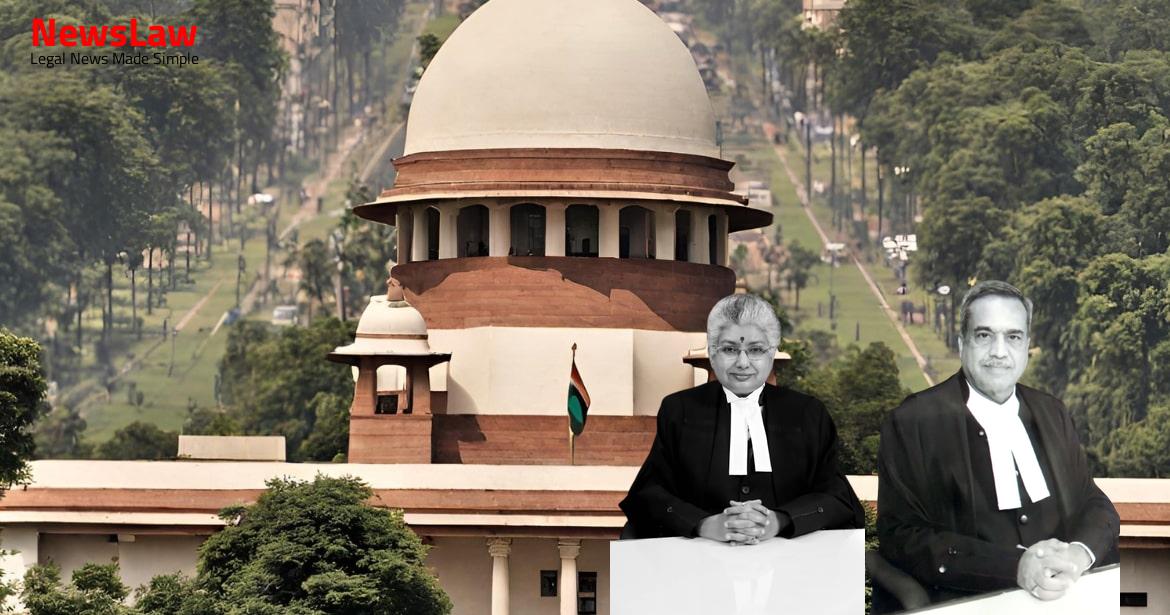The court’s thorough examination of Section 498-A IPC in the context of matrimonial disputes sheds light on the complexities of legal proceedings. This summary focuses on the court’s analysis and perspective on the application of the law, emphasizing the need for caution in implicating relatives and in-laws in criminal complaints. The blog delves into the court’s observations on the misuse of Section 498-A IPC, the importance of genuine cases, and the impact of false implications on legal proceedings.
Facts
- The complaint alleged that accused 2 were pressurizing the respondent wife to purchase a car as dowry.
- Threats were made to forcibly terminate the respondent wife’s pregnancy if demands were not met.
- Dispute was resolved, and the respondent wife returned to the matrimonial home.
- Appellants, including niece, mother-in-law, sister-in-law, and brother-in-law, filed a Special Leave Petition after the High Court dismissed their appeal.
- High Court took cognizance of the offence under section 498A, 323 IPC against the husband and issued summons.
- Magistrate concluded no prima facie case against in-laws due to lack of specific allegations.
- Appeal filed against the High Court’s order dated 13.11.2019 in Criminal Writ Petition No 1492 of 2019 under Section 482 CrPC.
- Complainant was married to Md. Ikram and filed a complaint against him and the appellants for dowry demand and harassment.
- Husband and appellants filed a writ petition before Patna High Court to quash the FIR, which was dismissed.
- Another complaint on 01.04.19 resulted in an FIR against Md. Ikram and the appellants under various sections of IPC.
- The High Court observed that the averments made in the FIR prima-facie disclosed commission of an offence.
- The matter was required to be investigated by the police based on the prima facie evidence presented.
Also Read: Assessment of Loss of Earning Capacity in Motor Accident Claim
Issue
- The foremost issue in this case is whether allegations against the in-laws Appellants are general omnibus allegations that should be quashed.
Also Read: Enhancement of Compensation in Workmen’s Compensation Act Case
Arguments
- Appellants argue that the Police Officer should have conducted a preliminary inquiry before registering the FIR, citing Lalita Kumari Vs. Government of U.P. & Ors. (2014) 2 SCC 137.
- Previous criminal complaint by Respondent wife in 2017 resulted in summons only against the husband, with allegations against appellants found to be general in nature.
- Appellants claim the FIR was filed with a revengeful intent to harass them.
- Reference made to Social Action Forum for Manav Adhikar & Anr. Vs. Union of India, Ministry of Law And Justice & Ors. regarding abuse of provisions despite their constitutionality.
- State of Bihar argues that the FIR of 2019 is based on fresh incidents post-assurances given by husband, constituting a new cause of action and not a repetition of the 2017 FIR.
- Investigation post the 2019 FIR found the case true against all accused persons, making Lalita Kumari (Supra) inapplicable.
- Respondent No. 5 argues that only five out of the total seven accused challenged the FIR, including her husband.
- The accused husband, Md. Ikram @Sikandar, has not contested the impugned High Court judgment.
- The FIR contains serious allegations of physical and mental torture of the Respondent wife for dowry.
Also Read: Legal Analysis: Quashing of FIR and Criminal Proceedings
Analysis
- Section 498-A IPC is often misused as a weapon rather than a shield by disgruntled wives.
- Court observations highlight that complaints under Section 498-A IPC are often filed impulsively over trivial issues.
- The term ‘cruelty’ in Section 498-A covers acts that can lead to suicide, grave harm, coercion, or harassment.
- Court expresses concern over the rise in matrimonial disputes and the unnecessary inclusion of family members in legal battles.
- Judges emphasize on the need for discouraging matrimonial litigation in favor of amicable resolutions.
- Courts are advised to be cautious in implicating distant relatives in crimes related to matrimonial disputes without specific evidence.
- The legal fraternity is reminded of its duty to prevent the exaggeration of minor incidents in criminal complaints and to uphold the sanctity of marriage.
- Misuse of Section 498-A IPC can lead to unwarranted harassment of both the accused and the complainant.
- Marriage is highlighted as a sacred union aimed at peace and stability, emphasizing the original intent of Section 498-A IPC to combat harassment against women.
- Court reaffirms the constitutionality of Section 498-A IPC but warns against unnecessary arrests that may hinder amicable settlements.
- Protracted criminal trials are noted to breed bitterness in relationships, while genuine cases of dowry harassment are also recognized as a serious concern.
- Implications and consequences of filing complaints without proper visualization
- Importance of finding the truth and punishing the guilty while protecting the innocent
- Scrutiny of allegations in matrimonial cases with care and circumspection
- Warnings against false implications and misuse of the law
- Difficulty in ascertaining the truth even after criminal trials
- Caution against proceeding against relatives and in-laws without a prima facie case
- Preventing multiple cases from arising out of a single complaint
- Purpose of Section 498A of IPC and increase in matrimonial litigation
- Impact of complaints on chances of amicable settlement
- Call for maintaining the noble traditions of the legal profession in handling Section 498A complaints
- General allegations in the FIR against the Appellants with no specific roles attributed
- The FIRs dated 01.04.19 and 11.12.17 are distinct and independent instances based on separate transactions.
- No specific allegations against the in-laws of the Respondent wife have been established in the present complaint.
- Prosecution in the absence of clear allegations against the accused Appellants would be an abuse of the legal process.
- An unjust trial for the Appellants should be avoided as general and omnibus allegations do not warrant prosecution.
- A criminal trial leading to an acquittal can leave severe scars on the accused and should be discouraged.
- Despite assurances given by Md. Ikram to not harass the Respondent wife for dowry, the accused continued their demands and harassment.
Decision
- The appeal is allowed.
- The order passed by the High Court of Patna on 13.11.2019 is set aside.
- The FIR No 248 of 2019 against the Appellants under specified sections of IPC is quashed.
Case Title: KAHKASHAN KAUSAR @ SONAM Vs. THE STATE OF BIHAR (2022 INSC 163)
Case Number: Crl.A. No.-000195-000195 / 2022



